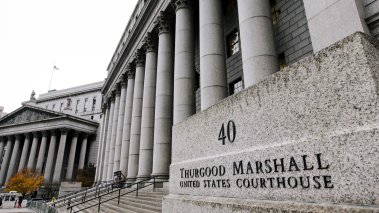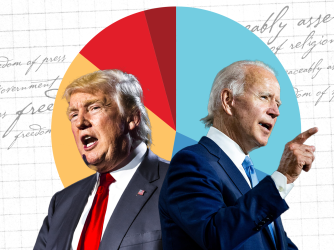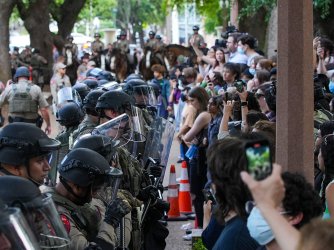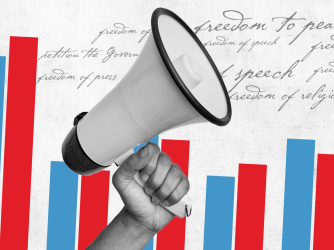Table of Contents
Federal judge fast-tracks FIRE preliminary injunction proceedings challenging New York’s online speech police law

elbud / Shutterstock.com
Just one week after FIRE filed a lawsuit challenging a New York law that would require online services to address “hateful” content that users post to their platforms, a federal judge ordered that briefing be expedited and set a teleconference for Dec. 19 to consider the new law’s constitutionality.
State lawmakers passed the law, which took effect Dec. 3, in response to the tragic mass shooting by a white supremacist this past May in Buffalo, New York. It targets online speech that lawmakers consider “hateful,” and is so overbroad it reaches a vast amount of protected speech.
But FIRE is fighting back. We teamed up with First Amendment scholar and blogger Eugene Volokh, video-sharing site Rumble, and social-community site Locals to file a lawsuit seeking an injunction to protect online speech against this unconstitutional law.
If you value free speech on the internet, you should oppose New York’s law, the first step in the state’s misguided plans to take on free speech on the internet.
The law targets “social media networks,” broadly defined to include a wide array of sites, apps, and platforms that have helped create a vibrant free speech environment on the internet for differing viewpoints. On Volokh’s blog, for example, legal scholars and commenters debate hot-button legal issues with a shared commitment to robust freedom of expression, including speech that some might find unsettling, disturbing, or even hateful.
But New York lawmakers have come out forcefully against online speech that someone, somewhere, considers hateful. Because the First Amendment prohibits the state from directly censoring “hate speech,” New York’s legislature hit upon another solution: Conscript bloggers and online platforms to act as the speech police.
Big Brother comes to the Big Apple
New York’s new law, titled “Social media networks; hateful conduct prohibited,” compels websites to adopt a policy for addressing speech the State dislikes. This includes any speech perceived to “vilify” or “humiliate” someone based on characteristics like race, gender, or religion. Website operators must also create a reporting mechanism to enable users to complain about content posted to each social media network, the operators of which must then respond directly to each complaining user.
Websites that fail to comply with the law face daily fines of up to $1,000 for each violation. While that might not seem like a lot for a global entity like (for example) Facebook, it could be crippling for a small blogger who generates little more than the revenue needed to keep their site online. No one could blame websites for concluding the law counsels removing content before it angers the New York attorney general.

LAWSUIT: New York can’t target protected online speech by calling it ‘hateful conduct’
Press Release
Today, the Foundation for Individual Rights and Expression sued New York Attorney General Letitia James, challenging a new state law that forces websites and apps to address online speech that someone, somewhere finds humiliating or vilifying.
The law’s penalties are all the more concerning given that New York’s definition of “hateful” speech is incredibly broad. Depending on who’s looking, almost anything on the internet can qualify as “vilifying” or “humiliating.” For instance, a comedy sketch by John Oliver poking fun at the British monarchy can be categorized as humiliating English people based on their national origin; an interview by ReasonTV discussing a satirical tweet by the Babylon Bee calling the Biden administration’s assistant secretary for health Rachel Levine its “man of the year” may be considered “vilifying” or “humiliating” to transgender people; and a black and white historical video of Malcolm X discussing white people’s guilt can be viewed as “vilifying” or “humiliating” white people based on their race.
If you value free speech on the internet, you should oppose New York’s law, the first step in the state’s misguided plans to take on online expression. A report released last month by New York Attorney General Letitia James called for repealing key legal protections for social media websites, restricting livestreaming, and requiring websites to monitor and track “hateful” content.
A tragedy in Buffalo does not justify a rush to crack down on the free expression of ideas online. As my colleague and FIRE Senior Attorney Jay Diaz explains, “What happened in Buffalo broke the nation’s heart, and the impulse to take action is understandable. But violating expressive rights online won’t make us safer.” Fortunately, FIRE’s clients are standing up for the First Amendment and telling the state of New York they won’t join its speech police.
Recent Articles
FIRE’s award-winning Newsdesk covers the free speech news you need to stay informed.

New FIRE poll: Americans equally skeptical Biden or Trump will protect First Amendment rights

Here’s what student journalists need to know about covering campus protests



